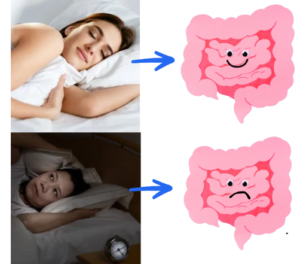Understanding the Vital Connection Between Quality Sleep and Digestive Health
Sleep is not merely a period of rest; it is an essential biological function that profoundly impacts our digestion. The intricate relationship between sleep and digestive wellness encompasses various physiological processes that work in synchrony. The human body's circadian rhythm, often referred to as the internal body clock, aligns both sleep cycles and digestive functions. This synchronisation elucidates why individuals frequently experience hunger at regular intervals each day, demonstrating how our biological systems are finely tuned to natural cycles and rhythms.
The Indispensable Role of Restorative Sleep in Enhancing Digestive Performance 
Sleep is crucial for the body’s ability to heal, rejuvenate, and recover. The deeper stages of sleep are particularly vital for these restorative functions. During these profound phases, not only do the organs, tissues, and cells constituting the digestive system undergo relaxation, but they also engage in essential repair processes. The body prioritises cellular repair and regeneration during deep sleep, particularly for the cells lining the digestive tract, which undergo continual wear and tear due to their exposure to food particles and digestive enzymes. This regeneration is fundamental in maintaining the integrity of the gastrointestinal lining, thereby enhancing the overall efficacy of digestion.
Deep sleep also plays a significant role in strengthening the immune system, a function that is particularly critical for the digestive system, which houses its own specialised immune cells activated by beneficial bacteria present in the gut. These immune cells are vital for protecting the gut and the entire digestive tract from harmful microorganisms, thus ensuring a balanced population of bacteria within the gut ecosystem.
Moreover, the organs involved in the digestive system are integral to detoxification, aiding in the removal of waste and harmful substances from the body. Deep sleep significantly enhances this detoxification process by boosting the operational efficiency of the liver and kidneys, allowing these vital organs to function optimally. This synergistic relationship between sleep and detoxification is a key contributor to overall digestive health and wellness.
Understanding How Sleep Patterns Affect Gut Motility
An essential aspect of digestion involves the efficient movement of food and waste through the digestive tract, a process known as gut motility. This process undergoes significant changes during sleep. Throughout both deep and light sleep, the rate of gut motility is considerably reduced. This reduction is a necessary adaptation, allowing the digestive system to conserve energy, which is then redirected towards the repair of digestive tissues. Consequently, this energy conservation enables the digestive process to function more efficiently when awake, optimising both nutrient absorption and waste elimination.
The migrating motor complex represents a series of contractions that occur during fasting periods, including during sleep. This cycle is crucial for gut motility, as it effectively clears away food particles and residual matter that may linger in the digestive system. This natural cleansing mechanism of the digestive tract reduces the risks of bacterial overgrowth, fostering a healthy gut environment. Notably, the migrating motor complex is most actively engaged during the night, when individuals are fasting and asleep, underscoring the vital role of sleep in preserving the health of the digestive system.
As dawn approaches, gut motility gradually increases, preparing the digestive system to effectively process and digest food. This rise in motility can also prompt the first bowel movement of the day, exemplifying the finely tuned relationship between sleep and gut motility. Grasping this connection is essential for optimising digestive health and enhancing overall well-being.
Investigating Hormonal Interactions Between Sleep and Digestive Health
Ghrelin, commonly referred to as the hunger hormone, is a significant hormone that stimulates appetite. In contrast, leptin signals to the brain that the stomach is full, thus helping to prevent overeating. Together, these hormones play a crucial role in appetite regulation, yet their functions can be negatively impacted by inadequate sleep.
Even a single night of poor sleep can trigger elevated levels of ghrelin, which can increase appetite and often lead to cravings for carbohydrates. This phenomenon is frequently described as feeling ‘hangry’. To make matters worse, levels of leptin can decrease after a night of insufficient sleep, disrupting the signals that indicate satiety. This creates a challenging scenario where individuals may overeat and make unhealthy food choices while struggling to recognise their body's cues to stop eating. Although occasional poor sleep may not lead to serious consequences, chronic insomnia can result in significant digestive issues, including inflammation in the gut, liver disorders, gastroesophageal reflux disease, inflammatory bowel disease, and even colorectal cancer, in addition to contributing to weight gain.
The Impact of Sleep Disruption on Digestive Health
Disruptions to sleep can lead to a myriad of digestive issues. Factors such as shift work, particularly night shifts, and experiencing jet lag can significantly disrupt sleep patterns and throw off the body’s internal clock. Additionally, late-night eating or irregular meal timings can adversely affect the quality of sleep. The circadian rhythm that regulates sleep is intricately linked to natural sunlight, which is vital for maintaining a healthy sleep-wake cycle.
Regrettably, in today’s technology-driven world, many individuals spend most of their daytime indoors, leading to diminished exposure to natural light. This shift has also resulted in increased exposure to blue light emitted by electronic devices such as laptops, televisions, and smartphones, further disrupting the sleep cycle and sleep patterns, particularly when such exposure occurs shortly before bedtime.
The cumulative effects of these factors can lead to serious digestive issues, including diarrhoea, ulcers, inflammatory bowel disease, or disruption of the delicate balance between beneficial and pathogenic bacteria in the gut. This imbalance can also compromise the gut lining, exacerbating the situation concerning digestive health.
Enhancing Microbiome Health Through Quality Sleep Practices
The microbiome refers to the trillions of microorganisms residing in the gut, primarily composed of beneficial bacteria known as probiotics, alongside viruses, fungi, and potentially harmful bacteria. These microbes are essential not only for overall health but also for digestive health. They bolster the immune response and aid in digestion, facilitating the production of various vitamins, enzymes, hormones, and amino acids. Recent studies have illuminated a significant association between the microbiome and sleep, indicating that disrupted sleep or chronic insomnia can adversely affect the balance of these microbes, ultimately impacting digestive health and overall wellness.
Exploring the Complex Interactions Between Microbiome Health and Sleep Quality
The relationship between sleep and microbiome health is intricate and multifaceted. Insufficient sleep can negatively affect microbiome health, while an imbalanced microbiome can also detrimentally influence sleep quality. To comprehend this complex interplay, one study revealed a correlation between a higher abundance of certain bacterial types in the gut and quicker sleep onset, along with fewer awakenings during the night. Although this article cannot explore all the findings in depth, the key takeaway is that fostering a diverse and abundant population of beneficial bacteria in the gut is essential for achieving optimal sleep, effective digestion, and maintaining overall health.
Examining the Interrelationship Between Stress, Sleep, and Digestive Wellness
A common consequence of stress and anxiety is disrupted sleep. Conversely, these mental health challenges can also adversely affect the physical health and functionality of the digestive system. This disruption can lead to altered gut motility and contribute to issues such as indigestion, ulcers, and irritable bowel syndrome. A critical factor in this dynamic is the impact of the so-called stress hormone, cortisol.
The Influence of Cortisol on Digestive Processes
When cortisol levels rise, the body enters a fight-or-flight state. This physiological response redirects blood flow to critical areas such as the heart, brain, lungs, and muscles while diverting it away from the digestive system. This response prepares the individual for confrontation or escape, a reaction that was crucial for survival in prehistoric environments.
In modern times, however, stressors are often less life-threatening, such as financial worries, workplace pressures, or inadequate sleep. While short-term redirection of blood flow may be beneficial in acute situations, chronic stress can have detrimental effects on the digestive system, particularly concerning gut motility. This can manifest in symptoms including constipation, diarrhea, indigestion, gas, and bloating. Therefore, implementing effective stress management strategies is essential for supporting both gut health and achieving restorative sleep.
Ensuring sufficient sleep is paramount for maintaining a healthy digestive system, as the interplay between sleep and digestion is inherently intertwined. Prioritising effective sleep hygiene practices is crucial for achieving restorative sleep. This includes minimising exposure to blue light from electronic devices, adhering to a consistent sleep schedule, creating a cool, dark sleep environment, avoiding food intake within two hours before bedtime, and ensuring ample exposure to natural light during the day, especially in the morning.
References
Understanding Digestive Health and Circadian Rhythms
Exploring Sleep Dysfunction and Digestive Conditions
Examining the Link Between the Gut Microbiome and Sleep
Investigating Stress and Its Effects on the Digestive System
The Article: How Sleep Affects Your Digestive System appeared first on https://janestevensnutrition.com
The Article: Sleep’s Impact on Your Digestive System Explained appeared first on https://janestevens.net
The Article Sleep’s Impact on Digestive Health Explained Was Found On https://limitsofstrategy.com

